How an Otter Creek Homesteader's Big Mouth Shook the State and the Nation
January 24, 2020
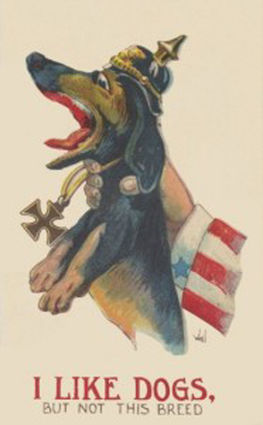
An example of the anti-German propaganda put out by the US government during WWI. (Photos courtesy Shane Dunning)
A column on local history, researched and written by Shane Dunning. Shane may be reached at [email protected].
To say being German in Montana in 1917 was complicated would be an understatement. The United States had, at long last, abandoned neutrality and entered World War One on the Allied side. Along with the declaration and its build-up came a wave of anti-German hysteria that was particularly virulent in Montana. Sauerkraut was re-named "Liberty Cabbage" and Daschunds were called "Liberty Hounds." On a much more serious front, the politics of the War in Montana became mixed with the toxicity surrounding labor unions (particularly the International Workers of the World) and the Anaconda Copper Mining Company. In Butte in 1918, IWW agitator Frank Miller was lynched for his supposedly "pro-German" political views.
On June 18, 1917, President Woodrow Wilson signed the Espionage Act of 1917. This law ostensibly made it illegal to utter false statements interfering with the operation or success of military operations while the United States was at war. However, anti-German hysteria around the country caused the arrest of pacifists and other simple war critics under the new law. At the time, there was not a significant amount of free-speech case law, and the constitutionality of these type of laws was an open question. A legal confrontation was imminent.
The focus of all these forces ultimately came down upon, of all things, a well-known Otter Creek homesteader and cattleman named Ves Hall. In 1900, Hall was working for John B. Kendrick's OW Ranch. He and Ves Newell had a cattle and horse operation (Hall and Newell) on Otter Creek just south of Ashland before the Newell's sold out to run the Ashland Inn. In 1916, his ranch was bought by the Gentry's.
In January 1918, Hall was living in Ashland and expressed some decidedly anti-war views. He was indicted in Federal court in Butte on four counts for (1) spreading false reports and statements calculated to defeat the military and naval forces of the US (2) and with causing and attempting to cause insubordination, disloyalty, mutiny and refusal of duty by defaming President Woodrow Wilson. Among the statements testified to included:
• That Germany would whip the United States, and he hoped so
• President Wilson was a British tool
• That President Wilson was the crookedest son-of-a-bitch to ever be President and was the richest man in the United States
• That Germany had a right to sink ships such as the Lusitania and kill Americans without warning
• That the US was fighting for Wall Street millionaires and to protect JP Morgan's interests in England
The US Attorney in Montana was Burton K. Wheeler, a future US Senator. He considered prosecution of the Espionage Act very problematic and quickly gained a reputation for being less-than aggressive in such cases. However, he was away in Washington when Hall and Ashland banker A.J. Just were arrested. In his stead, F.F. Haynes, a strongly pro-war Rosebud County prosecutor was placed in charge of the case. He ordered Hall and Just to remain in Ashland while out on bail. Hall sought the advice of Rosebud County Judge Charles Crumm. Crumm recommended Hall and Just talk to Wheeler who had just returned to Butte, and they immediately left on a train.
When Haynes learned Hall had left Ashland, he wired the Sheriff in Butte and had them arrested as soon as they stepped off the train. Wheeler's return from Washington found the press loudly supporting Hall's prosecution. Federal Judge George Bourquin was sympathetic to Wheeler's skepticism on the Espionage Act and told the US Attorney he (Bourquin) was in a better position to deal with the issues presented by the new law.
The Great Falls Tribune stated that witnesses for the defendant
testified today that Hall had subscribed for $3,000 worth of Liberty bonds, and attended a food conservation meeting, and that he had referred with pride to the fact that his father had fought in the Civil War and that his brother had been killed at the battle of San Juan Hill in the Spanish-American War. His attorneys, in their opening statement, insisted that many of Hall's remarks were made jocularly and that he was not in earnest when he remarked to a woman at the Newell hotel that he would go to Mexico before he would fight.
Bourquin's opinion in United States vs Ves Hall dismissed the case that eventually became a landmark in free-speech case law. His directed verdict specifically authored his opinion "because of the grave issues and the necessity for interpretation of the Espionage Act, to the end that a precedent be established..." Hall and Just were free men.
Bourquin did not question whether Hall made the "unspeakable" comments that caused the case.
Having in mind the rule applicable to this motion for a directed verdict, the evidence would justify a finding that defendant did so make the declarations charged. But it would not support a verdict of guilty of any of the crimes charged. It appears the declarations were made at a Montana village of some 60 people, 60 miles from the railway, and none of the armies or navies within hundreds of miles, so far as appears. The declarations were oral; some in badinage with the landlady in a hotel kitchen, some at a picnic, some on the street, some in hot and furious saloon argument.
The opinion's immediate effects were many and significant. Hall and Just were released. Rosebud County Judge C.L. Crumm, who had testified as a character witness for Hall, went to the State Attorney General S.C. Ford's office to discuss the implications of the Hall case. As he entered Ford's office, he found his nemesis Haynes already there, visiting the Attorney General. Haynes stated to Crumm as he entered the room: "I came to get General Ford's opinion on the dicta in the decision. Since nothing can be done under United States law, it is absolutely necessary that something be done under state laws with the pro-German element of Rosebud county."
Judge Crumm replied "I don't believe there are any pro-Germans in Rosebud County." Haynes responded that he believed Judge Crumm himself was pro-German. Crumm then pulled an automatic pistol and aimed it at Haynes, shouting:
"God damn you, I'll kill you like a dog. You have published me in eastern Montana as a traitor and I'll kill you like a dog!"
Judge Crumm quickly backed down. Before the Ves Hall case, Crumm had a sterling reputation. This incident at the attorney general's office caused him to be the first judge impeached by the State of Montana. The legislature was so determined to impeach him that it continued its proceedings even after Crumm resigned his office.
The effort to do something in state law to curb the plague of sedition in Montana eventually bore fruit in the special session of 1918. Montana passed its own sedition law and eventually 79 Montanans were jailed in 1918 and 1919, some sentenced to over twenty years. Montana's law was used as a template for stronger anti-sedition legislation on the Federal level. Eventually, anti-German hysteria died down. In 2006, Governor Schwietzer posthumously pardoned those jailed on the state charges. Judge Crumm was exonerated in 1991 by a 46 to 0 vote of the Montana Senate.
US Attorney Wheeler eventually became a US Senator for Montana, where he played a critical role in stopping FDR's attempt to pack the US Supreme Court. In his autobiography, he cites the Hall case and the anti-German hysteria for his decision to support so strongly the independence of the Federal court.
Ves Hall returned home briefly but quickly left the state for Alaska, passing away in 1954. In my research, I could find no picture of the man whose words caused such a commotion. If anyone has a picture in their family photos, I would appreciate being able to get a good copy of it. He virtually disappears from local history books and none mention this unfortunate moment in Montana history.

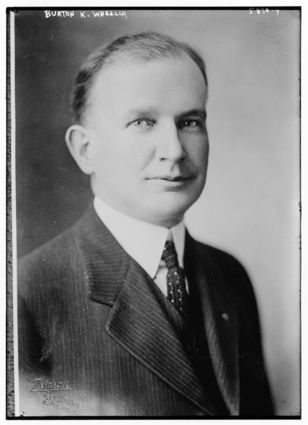
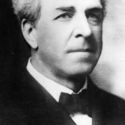
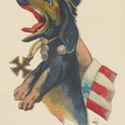
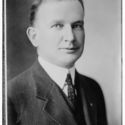








Reader Comments(0)